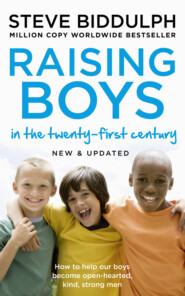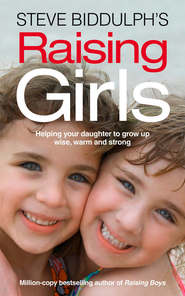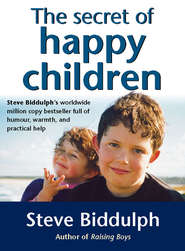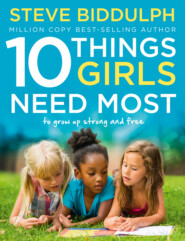По всем вопросам обращайтесь на: info@litportal.ru
(©) 2003-2024.
✖
The Complete Parenting Collection
Автор
Год написания книги
2018
Настройки чтения
Размер шрифта
Высота строк
Поля
A lot of fathering of boys is simple. Here are some clues:
Most boys love to be physically active, to have fun with their fathers. They love to hug their dad, and play-wrestle with him. (If they don’t like it, you’re probably being too rough!)
They like to accompany you on adventures and experiences in the big, wide world – all the while feeling secure because dad seems so huge and capable (even if he doesn’t feel that way himself half of the time).
They love to hear stories about your life, meet your friends, and see what you do for a living.
They love you to teach them things – anything, really. If you don’t know about things like fishing or making stuff in sheds or fixing go-karts or computers, and so on, well, you can learn together. It’s trying that counts.
PRACTICAL HELP
MIRROR NEURONS
In 2006 an incredible discovery was made: namely, the existence in the body of mirror neurons. These are a network of nerve cells that run alongside our motor nerves, and they have a unique role. They mirror, or imitate, everything we watch. So if we watch ballet, or football, or someone having a passionate kiss, our mirror neurons practise this action. The mirror actions are stored in our brain, ready to make it easier to copy what we’ve seen. (So every couch potato really does have an inner athlete, or rock star, or red-hot lover eagerly trying to get out!) This, we now know, is the reason that we can learn skills as fast as we do. But it’s a two-edged sword, because it means that everything kids see, they take into their brains and are inclined to repeat. The ramifications of this are huge.
This certainly impacts on what we might allow children to watch on TV and in computer games, and it underlines the importance of not depicting violence or violent sex in the media. But it especially impacts on how we behave around our kids. If children see us always being grumpy, self-pitying, sneaky, lying and cheating, vicious or mean, they become that. They take in our actions, but also our moods and outlook. Many a man has been horrified to notice he has the same gestures, movements or expressions that his father used to have. Or he comes out with words or sayings that his old man used to use. Psychologists hear this all the time in their consulting room: ‘I hate the guy, and now I am turning out just like him’. This is not genetic, it’s ‘mirror learning’. It’s a good reason to really work on how you act around your kids.
Kids learn your attitudes
Kids don’t just learn from what you say to them, they take on your attitudes as well. A friend of mine, a Vietnam veteran, was driving with his children and pulled up at some traffic lights. An Asian family were among those crossing at the lights. My friend’s four-year-old, strapped into his booster seat in the back, suddenly made a racist comment! My friend recognised his own words, and was shocked to hear them from a child: they sounded ugly and wrong to him. He found a parking spot and pulled over. He told his child he was sorry he had ever spoken like that, and he didn’t want the child ever to speak like that either.
Kids learn to love by watching you
Children even learn about love by watching you. They love it when you show warmth to their mother, give her a compliment, flirt, exchange a cuddle or a kiss. Most small children cannot resist squeezing in whenever they see their parents hugging. They love to soak in the feeling of the two of you. When you are private, and close the bedroom door, children even learn from this some of the awe and mystery of love.
Being respectful to their mother is important. So is being self-respecting – not getting into abusive or nasty arguments. Your son needs to see not only that women are never abused, but that a man can argue calmly, without fighting or lashing out – that he can listen, but also make his point and insist on being heard.
Kids learn to feel by watching you
Sons learn how to express their feelings by watching their fathers and other men. They need to see you showing all four of the basic feelings:
1. Sadness – when someone has died or a disappointment has come along
2. Anger – when something has been unjust or wrong
3. Happiness – when things go well, and
4. Fear – when there is danger.
Dads have to show real care in expressing feelings around their children. The reason for this is that dads and mums are the pillars of a child’s world. Children don’t want to see those pillars come tumbling down. So while they need to know and see when we are angry, scared, happy or sad, they also want to know that we can ‘hold’ those feelings. This means that we can be afraid, but not rattled; mad, but not dangerous; happy, but not stupid; and sad, but not overwhelmed or dismayed. They don’t really want to see us losing our grip. But they are touched and helped if we can shed a tear or honestly express anger or fear, because they have those emotions all the time.
Often, when men have an uncomfortable feeling, they will convert it into something more comfortable. Usually anger is the most comfortable feeling for men. When your little boy has got lost in the shopping centre or your teenager has taken a foolish risk, a father who can say, ‘I was scared’, has much more impact than one who yells and slams doors. If men act angry when they are really sad, scared or even happy, this can be pretty confusing for kids.
Boys are trying to match their inner sensations with outer ways of behaving, and they need us to show them how this is done.
Whatever happens in your marriage, don’t divorce your kids
Divorce is a huge blow to a father’s hopes and dreams for his children. Some men feel so grief-stricken that they ‘cut and run’. Others have to fight the system to stay in contact with their children. It’s vitally important – whatever happens to your marriage – that you stay in your children’s lives. More and more fathers are sharing parenting equally (or more) after divorce. I’ve talked to men who, after divorce, decided it would be simpler for the children if they didn’t maintain contact. They always profoundly regretted this decision.
STORIES FROM THE HEART
SHOWING OUR FEELINGS
A few months ago, something happened that made me want to cry, and I hesitated, knowing my twelve-year-old son was in the room or close by. I’d just received a phone call telling me that a good friend had terminal cancer. I went into shock, put the phone down and began to fight back the tears. I walked into the living room, thinking: ‘Is this okay? Is this how I want my son to see me?’ The answer came back: ‘Of course, it’s good that he sees me like this.’
I asked my wife for a hug, and stood there holding her and sobbing. I felt my son’s approach and then his hand on my shoulder – he was comforting me! The three of us stood there hugging. It was wonderful, incredible to have things reversed like that.
Perhaps seeing me like that will mean that, when he needs to, he also will have access to the sweet release of tears. I don’t want him to be bottled up and volcanic when he meets the inevitable griefs of life. And I don’t think he will be. (A letter from Tony S.)
There are some great organisations for separated dads that have sprung up, which are mostly constructive and very helpful. Also divorce courts are now more aware that kids need fathers in their lives, and will work to make sure that contact is shared and maintained.
For your children’s sake, if your marriage comes to an end, learn to be polite and kind to your ex-partner, even if you don’t always feel it. Better still, work to preserve your partnership by giving that some time and attention too, before it’s too late.
Rough-and-tumble games: what’s really going on?
There’s a unique father behaviour that has been observed all over the world. Dads (along with big brothers, uncles and grandpas) love to wrestle and play rough-and-tumble games with little boys. They can hardly resist it. The men and the big boys get the little boys and throw them about. The little boys come running back and say, ‘Do it again!’ Sydney counsellor Paul Whyte puts it very plainly: ‘If you want to get along with boys, learn to wrestle!’
For a long time nobody understood why this was so – especially mothers, who are usually trying to calm things down, while dads seem likely to stir them up all over again! But it’s been found that what boys are learning in ‘rough and tumble’ is an essential lesson for all males: how to be able to have fun, get noisy, even get angry and, at the same time, know when to stop. For a male, living with testosterone, this is vital. If you live in a male body, you have to learn how to drive it.
The big male lesson: knowing when to stop
If you’ve ever wrestled with a little boy, say a three- or four-year-old, it always starts out happily enough. But often, after a minute or two, he ‘loses it’. He gets angry. His little jaw starts to jut out! He knits his eyebrows together and (if you haven’t spotted the warning signs yet) starts to get serious and hit out with knees and elbows. Ouch!
A dad who knows what he’s doing stops the action right there. ‘Hoooooold it! Stop!’ Then a little lecture takes place – not yelling, just calmly explaining. ‘Your body is precious [pointing at boy], and my body is precious too. We can’t play this game if somebody might get hurt. So we need a few rules – like, no elbowing and no kneeing or punching! Do you understand? Can you handle it?’ (Here’s a tip: always say ‘Can you handle it?’ rather than ‘Will you keep to the rules?’, which sounds kind of wimpish. No boy is going to say ‘No’ to a question like ‘Can you handle it?’.)
Then you re-commence. The boy is learning a most important life skill – self-control. He’s learning that he can be strong and excited, but can also choose where and when to back off. For males, this is very important. In adult life, a man will usually be stronger than his wife or partner. He must know how to not ‘lose it’, especially when he is angry, tired and frustrated.
For a marriage to survive, it is sometimes necessary for partners to stand nose to nose, while saying some really honest stuff. This is called ‘truth time’ – the time when disputes that have been building up get aired and cleared up. (We wrote a book about this called The Making of Love.)
A woman can’t have this kind of honest and intense discussion with a man unless she feels absolutely safe with him. She needs to know she will never be hit, and he needs to know in himself that he won’t hit. (In some marriages, it’s the woman who is the violent one, the woman who needs to make this commitment.)
A real man is one who is in charge of himself and his behaviour. A real man can be furiously angry, and yet you feel utterly safe standing right next to him. That’s a tough call. But it begins in this small way, play-wrestling on the back lawn.
Dads can do this, uncles, friends, even mums (though mums don’t enjoy it quite as much).
STORIES FROM THE HEART
WHAT FATHERS DO
(by Jack Kammer)
This could be dangerous, I thought. This is Los Angeles, early June 1992. And, besides, it’s getting dark.
Stranded and alone, hauling a heavy suitcase along Washington Boulevard east of Lincoln Avenue, unable to find a phone that made sense or a taxi dispatcher interested in my fare, I was running late for my plane at LAX. I decided that this was a chance I needed, no, wanted to take. I approached three young Hispanic men standing outside their car in a fast-food parking lot.
But first a little background. I had just spent four days in the mountains above Palm Springs at a conference of men who wanted to give the nation new hope for old and growing problems. We were a few of the big fish in the small pond that some have called ‘the Men’s Movement’. We agreed that what the nation most urgently needs right now is a massive infusion of strong, noble, loving, nurturing, healthy masculine energy to counteract America’s malaise, impotence and social pathologies. We talked a lot about the importance of fathers, both as an archetypal metaphor and as a practical reality.
Back in the fast-food parking lot, I warily approached the three young, black-haired, brown-skinned men.











